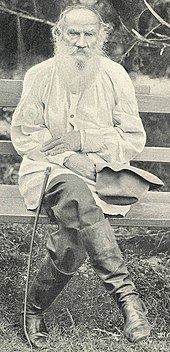The divine and the human
The divine and the human , also the divine and the human ( Russian Божеское и человеческое , Boscheskoje i tschelowetscheskoje ), is a story by Lev Tolstoy , which, written from 1903, appeared in 1906 in Tolstoy's Krug chtenija and - during the Tsar's time - was not banned until 1928 100th birthday of Tolstoy became permanently accessible to the reader. In 1983 the text in Volume 14 Powesti and Tales of the 22-volume Tolstoy edition was published by the Verlag für Künstlerische Literatur in Moscow .
content
Odessa towards the end of the 1870s: The Governor General of Southern Russia, a decorated German with heartache, signs the death sentence by hanging against the Novorossiysk University candidate Anatoly Svetlogub. Swetlogub had his money in a village school, a consumer and a sick plugged -Asyl. Ignati Meshenezki, one of the leaders of terrorist revolutionaries in southern Russia, had recruited Svetlogub to free the people from the rule of the landlords and the incumbent government. Though the people proved indifferent, Svetlogub had worked underground for seven years. Then Prokhorov, one of his fellow combatants, had asked Svetlogub to keep a load of dynamite . The next day the police found the package in Swetlogub's apartment.
Swetlogub is now facing execution after one month of solitary confinement full of privation. In his farewell letter to his widowed dear mother, he wrote that he would forgive Prokhorov, destroyed the letter and reformulated it. Swetlogub is not a traitor; also not an unintentional one. When a drum roll started the transport of the delinquent from prison for execution in the morning, an aged Raskolnik observed the process from his cell window.
Meshenezki is arrested and comes to the Peter and Paul Fortress in Saint Petersburg with the very old Raskolnik . Despite strict prison discipline, a guard does not refuse the old man's request for a conversation with the leading popularist. It's about the executed Swetlogub and his beliefs. The self-confident Meshenezki clarifies: “We believe that there are people who have usurped all power and are now ... deceiving the people ... These people must therefore be exterminated. They kill other people, and one has to reward them with like with like until they stop doing what they do. "
After seven years at the Peter and Paul Fortress, Meshenezki comes to Siberia . In Krasnoyarsk he can talk to four young revolutionaries and two young revolutionaries from the generation after the Narodomists. Khalturin , Kibaltschitsch and the Perovskaya would have done everything wrong, Meshenezki is informed. He should study Kautsky . Before the revolution, the peasants must first be torn from their clods and remodeled into proletarians in the factory . The new theory does not want to get into Meshenezki's head. He has to think - full of anger - of the serious allegations that Svetlogub's mother made him in her letter to his address in Siberia.
Eventually Meshenezki and old Raskolnik end up in the same prison again. Meshenezki hangs himself. God, in whom old Raskolnik can no longer believe, was not gracious either to the young Svetlogub or to Meshenezki. But God gives old Raskolnik, as the only one of the three in prison, a death “filled with great joy and calm”.
German-language editions
- Divine and human. German by Arthur Luther . S. 144–190 in: Gisela Drohla (Ed.): Leo N. Tolstoj. All the stories. Eighth volume. Insel, Frankfurt am Main 1961 (2nd edition of the edition in eight volumes 1982)
- The divine and the human. Translated from the Russian by Hermann Asemissen . P. 299–343 in: Eberhard Dieckmann (Ed.): Lew Tolstoi. Haji Murat. Late narratives . Vol. 13 by Eberhard Dieckmann (ed.), Gerhard Dudek (ed.): Lew Tolstoi. Collected works in twenty volumes . Rütten and Loening, Berlin 1986 (edition used)
Web links
- The text
- Entry in the list of works Late Stories (1888–1910)
- Entry at fantlab.ru (Russian)
- Marietta Boiko : Commentary on the text (Russian)
Remarks
- ↑ Swetlogub refers to the folklore Dmytro Lysohub (1849–1879) (footnote 299 on p. 615 in the edition used). Lysohub and Tschubarow (ru: Чубаров, Сергей Фёдорович; Tschubarow, Sergei Fyodorowitsch, born 1845) were hanged on August 8, 1879 in Odessa. Both had prepared an assassination attempt on the Emperor . (Russian comments at RVB.ru)
- ↑ Meshenezki refers to the popular German Alexandrowitsch Lopatin (ru: Герман Александрович Лопатин, 1845-1918) (footnote 306 on p. 616 in the edition used).
